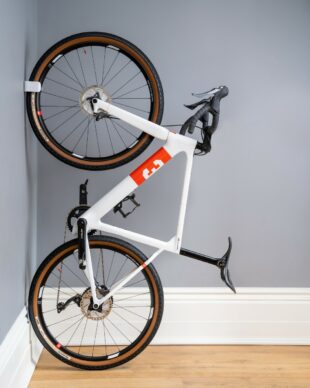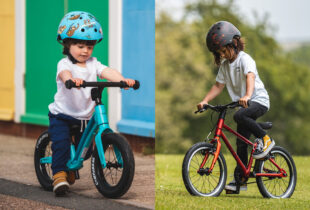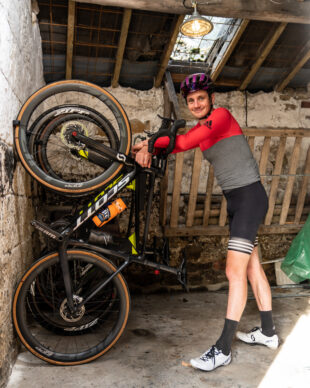Wheeling their way into the future, are Hornit - an innovative and creative British business that produces a wide range of cycling products. We spoke to their CEO Tom de Pelet about how Hornit has grown and how intellectual property rights have strengthened his business.
Find out how to protect your IP using our guidance pages.

‘The world’s loudest and the world’s smallest’
The Hornit business started with the invention of the loudest bicycle horn in the world, the Hornit dB140. Created to make riding in busy towns and cities safer and less stressful for everyone, the dB140 puts the rider in control of their safety by letting other road users know they’re there.
From this initial product, Hornit has expanded to produce a number of bikes and cycling accessories including the CLUG – the world’s smallest bike rack.

When you think of a bike rack, you may envisage the large metal poles that are dotted around our town centres. Or complex mounted structures designed to be used within garages. Tom and his team flipped this idea around, to create a minimalist clip that grips the bike tyre.
The CLUG can be fitted to any wall, offering an easy way to store bikes vertically or horizontally and is almost invisible when the bike isn’t there.
Putting an end to infringers
In the below video, Tom explains how registering his IP has given him the legal right to act against those selling fake versions of his products.
Tom registered his IP rights globally, which gave him a strong standing when defending his business against fake sellers. He described how this has allowed him to work with brand protection consultancy, SnapDragon to carry out searches of digital markets for counterfeit versions of the CLUG.
By taking down dozens of adverts of fake products and many thousands of listings on third party websites, Tom has been able to create a stronger brand image of the quality of his products.
So, you have a brand and a product, what next?
Searching for current trade marks, design registrations and patents will aid your application by allowing you to see if similar rights already exist. The IPO has a range of tools available to allow you to check if your trade mark is likely to be granted, and to see what exists already before applying for a patent. This is exactly what Tom did, which helped him when applying for Hornit as a brand name.
Search the trade mark register for similar brands before applying.
Find out more about what to do to prepare your patent application using our guidance.

Tom’s tips for protecting your business’ IP
Get specialised advice from a lawyer
Tom explained how there are many things to consider when looking at the IP that exists across a business. From the strategy of filing in different jurisdictions to drafting applications, the costs and the likely return on investment. He shared why it was so important for them to seek professional help:
A lawyer, such as a chartered patent attorney or chartered trade mark attorney can help you with your applications.
For patents in particular, it really is essential to use someone who knows what they are doing rather than trying to wing it yourself so that it is all done properly. It may seem expensive, but it is simply not worth cutting corners in such a highly specialised area of the law.
Future proof your protection
Tom advised other businesses to think about the possible markets or goods classes you may want to trade in the near future, so that your applications will keep you protected if you expand into these areas. This can also help you save money rather than filing a new application.
For a trade mark in the UK, each additional class after the first costs £50 but it’s worth noting that if you do not use the trade mark in these areas within 5 years, this class could be invalidated.

More than bike mounts
Hornit currently sells much more than bike mounts, with children’s bikes, helmets, horns and cycling protection making up their range. Part of their future plan is to look at what else there’s a market for, as Tom continues to invest in product development.
Not only this, but he and the team hope to grow the brand further in the different markets they already operate in.
2 comments
Comment by ben posted on
wish I had the same help. I even had a a copy asking me to stop copying them even though I have e registered IP. sadly still comes down to who has the money to fight it
Comment by Clive Bonny posted on
Thanks for a good example and case study
I also support using a trained IP advisor for IPO database searching as about 10,000 UK IP applications are rejected every year, often due to potential infringements. When trademark owners see infringing applications they can take serious actions